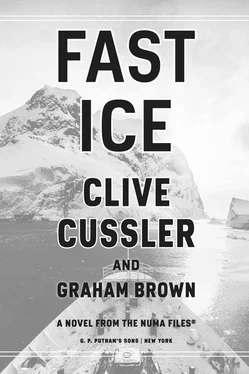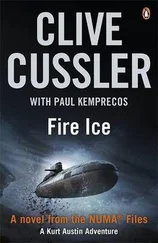Kurt shook Watson’s hand with a firm grip. “I’m sure the tales have grown in the telling,” he said. “We just do our jobs. Sometimes that leads us into a scrape or two.”
Watson laughed. “I’m told you had a scrape or two last night.”
“They were on foot,” Leandra said. “Trapped in a game park surrounded by lions and hyenas.”
Watson shook his head. “Lions and hyenas? You found yourself caught between the two greatest enemies on the savannah and came out alive. That’s a rare thing.”
“Don’t forget the men with guns,” Joe added.
The professor laughed deeply. “I see you prefer maximum level of difficulty.”
Kurt stretched and felt the aches and pains of the night’s efforts. “In all honesty, I prefer to sit on a sunny beach with a cold beer in my hand. But it never seems to work out that way.”
“Well, considering all you’ve been through,” Watson said, “the least I can do is examine the sample for you. You say these men were using algae to melt the ice?”
Kurt handed over the water bottle, which the professor studied through the clear plastic. “That’s what we overheard. Ryland claimed it was genetically modified algae. And the water changed to a dark green tint during the demonstration.”
“Looks rather clear to me,” Watson said. “But many golden brown diatoms and yellow algae appear invisible unless they’re present in high concentrations. I suppose we shall see.”
The professor shook the bottle gently to stir up anything that had settled and then poured small samples into a pair of test tubes. He put one in a machine that would check the mineral qualities of the water. The other was subject to a chemical dye test that should have brought out the presence of algae in the liquid. Yet again, the water appeared clear.
“Most interesting,” Watson said.
“I don’t see anything,” said Joe.
The professor cocked an eyebrow. “That’s what makes it interesting.”
Using an eyedropper, the professor took another sample and placed several beads of the water onto a glass slide, covered the sample with another slide and then placed it under the lens of a high-powered compound microscope.
The compound microscope had two eyepieces instead of one. This allowed it to focus more precisely and enabled the viewer to detect minute, three-dimensional structures.
“This model is designed for medical use,” the professor told them. “It magnifies images up to twenty-five hundred times. If there are any bacteria or algae in the water, we’ll find it.”
After adjusting the settings, Professor Watson took a look. He began with the 100 power setting before quickly switching to a more powerful lens. “Most types of algae will be visible at less than a thousand times magnification,” he said. “So far, I’m not seeing anything.”
Kurt stood back, letting the man do his job and passing the time by glancing at the machine that was analyzing the chemical content of the water. It churned and hummed as a few LEDs blinked but offered nothing to suggest any discovery.
The professor switched lenses again. “There are a few stray bacteria visible at a magnification of eight hundred. Probably left over from the mouth of whoever drank from this bottle before you used it as a collection vessel.”
“Will that skew the results?” Kurt asked.
“No,” the professor said. “To have any hope of performing the task you described, we would have to find something at a high level of concentration. A few bacteria would not affect that.”
Satisfied that there was nothing to see at eight hundred times normal size, the professor increased the magnification to a thousand times normal and then to fifteen hundred. He looked away from the eyepiece, scribbled a note and then looked back into the microscope.
Finally, he raised the magnification level to the full power of twenty-five hundred times normal. Kurt noticed a slight nod of the head and a change in the professor’s posture.
Pulling back from the microscope, Watson appeared satisfied. “Well,” he said. “See for yourself.”
As Professor Watson stood back from the microscope, Kurt moved in. He adjusted the eyepieces and pressed against them, squinting until his eyes became accustomed to the bright field of view.
Focusing intently, he looked for any sign of bacteria or algae. “I don’t see anything.”
“Because there’s nothing down there to see,” the professor replied. “No algae. Very little in the way of bacteria. Nothing organic of any consequence. This water is surprisingly sterile. Are you sure this is the right sample?”
“It came straight out of the pool,” Kurt said. “I collected it myself.”
The professor nodded politely and scratched at a spot below his ear. “It seems you’ve risked your lives to recover a bottle of purified water.”
“That’s impossible,” Joe said. “We saw Lloyd use this to melt the ice.”
“Perhaps it was heated,” the professor said. “Or perhaps the ice wasn’t really ice to begin with.”
“Trust me,” Joe said. “We sat on that ice, it was real and it was freezing. My glutes have only just thawed out.”
“The pool water was still frigid when I collected the sample,” Kurt said. “At most, it could have been just above freezing. That would have left the ice there for hours, if not days. It couldn’t have accounted for what we witnessed.”
The professor didn’t argue. “I don’t know what to tell you. If the ice was real and the water was cold, then something else must be at work.”
The machine behind them emitted a subtle beep. “Ah,” the professor said. “The chemical analysis is complete.”
He tapped a button on the face of the machine and an old dot matrix printer began spitting out the results of the test. When it was complete, Professor Watson grabbed the sheet of paper and tore it off.
“Well,” Kurt said, grinning. “Don’t keep us in suspense.”
The professor cleared his throat. “Your water sample contains elevated levels of calcium chloride. Along with even higher levels of potassium chloride, sodium chloride and a strong concentration of sodium acetate and glycol.”
“Rock salts,” Kurt noted.
“And aircraft de-icer,” Joe said, referring to the glycol.
“So, Ryland pumped de-icing fluid into the pool once he dimmed the lights,” Kurt said.
“The de-icer would float to the surface,” Joe said. “It would separate the ice from the water, eating away the frozen stuff at warp speed. Especially if it was heated before entry.”
Kurt understood now. “The rock salts would spread through the pool, changing the melting point of the water and keeping it from freezing once the glycol and sodium acetate had done their job.”
“He tricked them,” Leandra said.
Kurt nodded.
“But why?” Joe asked. “Why fool your own allies? Especially when they’re the kind of people who might react violently to being misled?”
Kurt fell silent, considering the question from a couple different angles. In the end, there were only a few possibilities that made any sense. “Either he doesn’t have the algae or it doesn’t work the way he says it does. Or . . .”
“Or what?” Joe asked.
“Or Ryland’s playing a different game,” Kurt said. “A longer, more complicated one. And we’re only seeing a small part of the big picture.”
28
NUMA HEADQUARTERS
Rudi was in his office, sitting behind his laptop, reading the latest baffling news from Kurt with a scowl on his face. He scanned the page twice to make sure he hadn’t missed anything, then closed the laptop screen with a deliberate excess of force.
“Easy, now,” a voice said from the doorway. “Computers are people, too. Or they soon will be.”
Читать дальше












